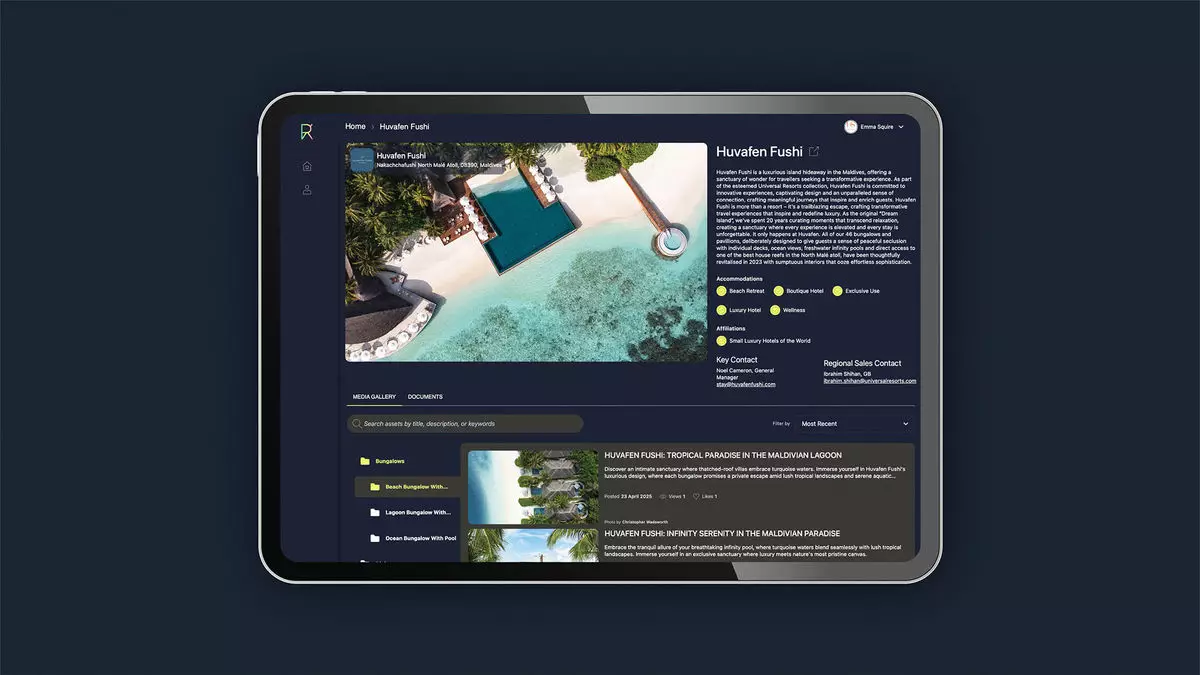Creating a bespoke travel experience for the ultra-wealthy is an intricate art that demands precision, detailed knowledge, and access to exclusive content. For travel advisors like Katie Terrington, every element of a luxury trip must be meticulously curated. However, the process of sourcing high-quality, relevant imagery and detailed property information can become an overwhelming challenge. Time-consuming searches, disorganized media libraries, and delayed responses from suppliers often hinder the ability to deliver seamless, personalized experiences. These obstacles reveal a fundamental flaw in the current ecosystem: a fragmented content supply chain that is ill-equipped to meet the expectations of wealthy clients who demand excellence down to the finest detail.
The frustration extends beyond the advisors’ hardships. Hotels, resorts, and service providers grapple with their own inefficiencies, inundated with email requests for media assets. The lack of a structured, accessible platform causes delays, often resulting in inconsistent marketing efforts and missed opportunities to engage discerning travelers. These issues create a bottleneck in the luxury travel industry, underscoring the urgent need for an integrated solution that serves both content creators and consumers with efficiency and sophistication.
The Emergence of Intelligent Content Hubs
In response to these persistent problems, innovative technology companies and industry veterans have begun to reimagine how travel content is shared. The development of centralized digital platforms—embodying artificial intelligence and streamlined asset management—marks a significant shift toward efficiency and professionalism. A prime example is Pixi, a platform designed specifically for the luxury travel market, launched with the goal of consolidating media assets and simplifying access for travel advisors.
Pixi’s platform automates the organization process, employing AI to categorize and tag images and videos with precise metadata. This feature reduces the manual labor and chaos often associated with media libraries, allowing advisors to find exactly what they need quickly. For suppliers, the platform becomes a valuable marketing tool. They gain deeper insights into which advisors access their content, enabling targeted outreach and relationship building. This creates a symbiotic environment: advisors receive instant, organized access to high-quality content, while suppliers benefit from increased visibility and engagement.
The platform’s expansion into other verticals like airlines, private jet companies, and tourist boards underscores its potential to revolutionize the entire travel ecosystem. By establishing a standardized hub for premium content, Pixi aims to redefine how luxury travel brands connect with their audience and streamline communication within the industry.
The Transformative Impact of Digital Asset Management
Centralized platforms like Pixi are not merely about tidying up digital assets—they are fundamentally transforming industry practices. For luxury travel advisors, immediate access to high-caliber visuals and detailed property descriptions means they can craft compelling narratives that resonate emotionally with their clients. Instead of sharing generic social media links—which may be inappropriate or insufficient—they can now deliver bespoke content tailored precisely to individual preferences.
From the suppliers’ perspective, the benefits are equally compelling. By acting as a lead generator, Pixi provides brands with analytics and insight into who is engaging with their content. This fosters more strategic outreach and relationship management, turning passive content into active business opportunities. The model leverages technology to enhance personalized service while simultaneously strengthening commercial ties.
Furthermore, the platform’s commitment to ease of use—being free for industry professionals and requiring only credential verification—lowers barriers to adoption. This democratization of access ensures that smaller boutique properties can participate alongside global brands, fostering a more inclusive and competitive marketplace.
Redefining Luxury Content Sharing in the Digital Age
The significance of platforms like Pixi transcends mere convenience; they embody a shift toward a more refined, discreet, and efficient method of content sharing tailored for high-net-worth clients. In an era where curated experiences are paramount, trust and personalization become the currency of success. Travel advisors are increasingly looking for tools that allow them to seamlessly integrate visual narratives into client interactions, whether during calls, emails, or on personal consultations.
The luxury clientele’s desire for privacy and bespoke service further amplifies the importance of this evolution. Social media links or impersonal image galleries no longer suffice; instead, advisors need a discreet, direct connection to the authentic essence of each property or service. Digital asset hubs offer this by providing curated, high-quality content that can be shared swiftly and securely, reinforcing their image as sophisticated professionals capable of delivering the best.
By embracing these advanced platforms, the luxury travel industry can elevate its standard of service, emphasizing authenticity, exclusivity, and efficiency. As more suppliers and advisors recognize the advantages, a future where comprehensive, AI-enhanced content hubs become industry norms is not only plausible but inevitable. This technological revolution promises an era where luxury travel is defined by effortless access to stunning, detailed content—and by the ease with which it translates into memorable, personalized journeys.


Leave a Reply